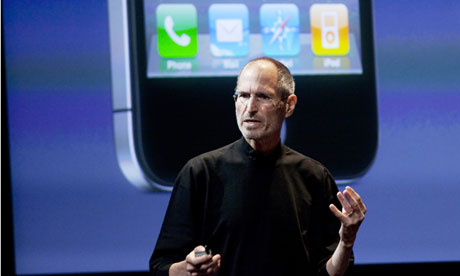Apple profits up 124% year-on-year after record iPhone sales
Source: Charles Arthur
 Apple's Steve Jobs announced a record quarter on the back of iPhone sales, which reached 20.34m, more than double the number sold last year. Photograph: David Paul Morris/Getty Images
Apple's Steve Jobs announced a record quarter on the back of iPhone sales, which reached 20.34m, more than double the number sold last year. Photograph: David Paul Morris/Getty Images
Apple has delighted its shareholders by racking up another record quarter, strengthened by strong sales of its iPhones, iPads and record sales of its Mac computers. It also hinted that the next version of the iPhone would be released in September, alluding to a "future product transition" then.
The firm's revenues were $28.57bn, up 90% year-on-year, and profits $7.31bn, up 124%, as it sold 20.34m iPhones �C more than double the number sold last year, ahead of the release of the iPhone 4 �C and 9.25m iPads, almost triple the number sold during its debut quarter in 2010. "We're thrilled to deliver our best quarter ever," said Apple's chief executive, Steve Jobs, on Tuesday.
The company's stock surged by $23.22, or 6.2%, to break $400 for the first time, and bringing it closer to being the most valuable company in the world by market capitalisation.
As the figures were released, the Wall Street Journal reported that some members of Apple's board have been talking to executive recruiters about finding a successor to co-founder and chief executive Jobs, who has been on extended medical leave from the company since January, while remaining as CEO.
The WSJ report, written by people familiar with the thinking of the company's topmost executives, says the board had approached the head of another "high-profile" technology company, apparently for informal soundings. Jobs told the WSJ he thought the idea was "hogwash".
He is taking his second extended leave in two years, and while neither Apple nor Jobs has announced the specific reason, it is believed to be due to complications arising from the neuroendocrine cancer diagnosed in 2003.
Aside from the WSJ story, which could cause discord in Apple's ranks, the company received more good news when it emerged that the Canadian government would not review the sales of $4.5bn of patents from the bankrupt communications company Nortel. Apple was in a consortium of successful bidders, along with Microsoft, for patents covering a number of mobile phone technologies against Google, whose Android mobile operating software has taken the largest share of the smartphone market.
Sales of the iPhone, in its best-ever quarter, mean that Apple will almost certainly have passed the formerly dominant Nokia to become the second-largest seller of smartphones in the world, behind Samsung. Nokia is expected to report a loss for the quarter when it reports on Thursday.
"Apple could overtake LG by the next quarter and become the third largest mobile phone vendor worldwide," said Carolina Milanesi, smartphone analyst at the research company Gartner. She estimated Apple could have sold 10m iPads in the quarter but for a fire at the Foxconn factory, which lost roughly 1m units.
Peter Oppenheimer, Apple's chief financial officer, said 57% of global Fortune 500 companies were either using or testing iPhones due to customer demands, and that 47% of them were testing the iPad tablet. He said there was a "future product transition that we're not going to talk about today" coming in the September quarter �C the inference is that it will be an update to the iPhone line.
Tim Cook, the chief operating officer who has been running the company in Jobs's absence, said that "we sold every iPad we could make".
The company will on Wednesday release the next version of its OSX operating system, called Lion, which it will deliver directly from its online store.
Analyst consensus ahead of the forecasts were that it would post $24.92bn in revenues and earnings of $5.5bn. After a quiet quarter, Apple's shares have ramped up in the past week, closing on Monday at an all-time high of $373.80 despite the absence of Jobs.
The expectation had also been that it would sell between 15m and 20m iPhones, between 7.2m and 9m iPads, and 4m Macs. Sales of the iPod, the music player that propelled Apple's successful comeback following its launch in October 2001, have continued to decline, a trend that began in 2009.
The record sales of its Macintosh computers, while small in the context of the wider PC market, showed 15% year-on-year growth �C the 21st quarter in a row they have grown faster than the broad market, which grew by just 2% in the same period. However, the growth in computer sales was the lowest the company had seen in two years.
| }
|